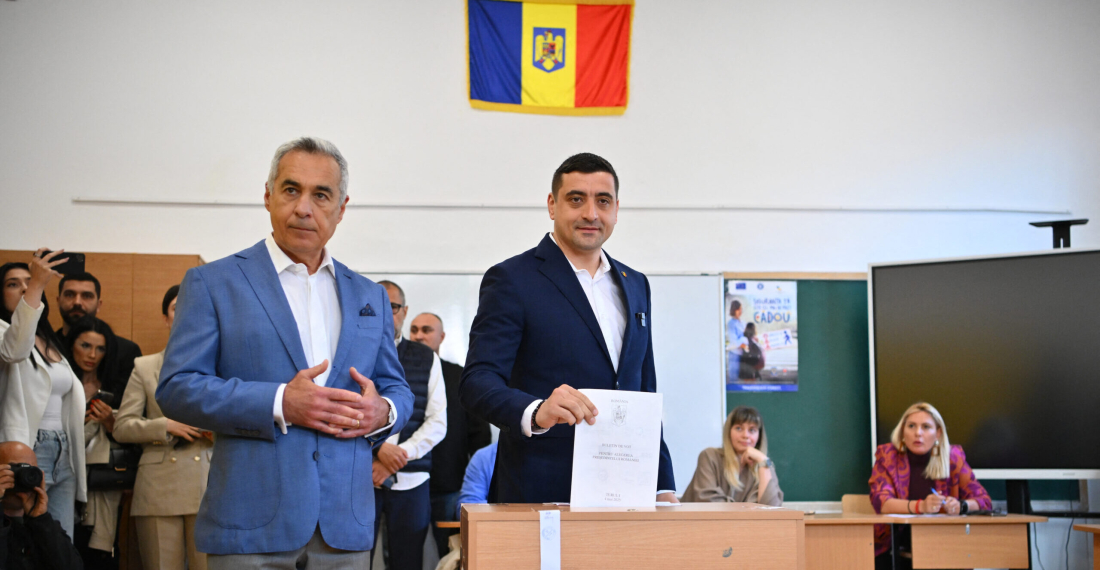George Simion, a nationalist and vocal supporter of U.S. President Donald Trump, won Romania’s first-round presidential election on Sunday by a landslide after capitalizing on widespread anti-establishment sentiment. The 38-year-old leader of the Alliance for the Unity of Romanians (AUR), will face a pro-Western reformist in a May 18 runoff that could reshape the European Union and NATO member country’s geopolitical direction.
Romania’s political landscape was upended last year when a top court voided the previous election in which the far-right outsider Calin Georgescu topped the first round. The decision followed allegations of electoral violations and Russian interference, which Moscow has denied. “For 35 years, the Romanian people lived the lie that we are a democratic country,” Simion, who came fourth in last year’s race and later backed Georgescu, told The Associated Press last week. “And now the people are awakening.”
Born in 1986 in Romania’s eastern city of Focsani, Simion took a bachelor’s degree in business and administration in Bucharest, and later a master’s degree at a university in the northeastern city of Iasi researching communist-era crimes. He also became involved in soccer ultra groups.
He took part in civic activism, including joining a protest movement against a controversial gold mining project by a Canadian company in a mountainous western region of Romania that contains some of Europe’s largest gold deposits. He also campaigned for reunification with neighboring Moldova.
In 2019, Simion founded the AUR party, which rose to prominence in a 2020 parliamentary election by proclaiming to stand for “family, nation, faith, and freedom,” and has since doubled its support to become Romania’s second largest party in the legislature. It opposes same-sex marriage and has close ties to the Romanian Orthodox Church.
Simion supports Trump and told AP last week that the AUR party is “perfectly aligned with the MAGA movement,” referring to the U.S. president’s Make America Great Again movement. Simion’s political platform has been built on a fiercely anti-establishment agenda and populist rhetoric. He labelled the canceled election last year a “coup d’etat,” and adopted stronger populist rhetoric and religious messaging to tap into Georgescu’s electorate. He has branded Romania’s current political system as a “hybrid regime” that failed to deliver democracy after the 1989 revolution toppled communism.
A Simion presidency would pose unique foreign policy conundrums. His activities in Moldova led to an expulsion and multiple entry bans on allegations of trying to destabilize the country. He is also banned from entering neighboring Ukraine for “systemic anti-Ukrainian” activities. “It is in their interest to have good relations with us,” he said of the two countries.
Observers have long viewed him of being pro-Russian and warn that his presidency would undermine both Brussels and NATO as the war rages on in Ukraine. He refuted the accusations as a “smear campaign” by leftists and said Russia has been the “main threat” to Romania in the last 200 years and remains so today. “This is why we need a strong NATO and we need troops on the ground in Romania, in Poland and in the Baltic states,” he said, although he was against sending further military aid to Ukraine.
On the EU, Simion said, “We want more power to the 27 states, not toward the European institutions,” and that he is “totally aligned” with the position of Italian Prime Minister Giorgia Meloni, who was the only EU head of government to attend Trump’s inauguration in January.
Source: commonspace.eu with agencies. Photo: Presidential candidate George Simion (R) casts his vote with Călin Georgescu. Alex Nicodim/Anadolu/AFP






